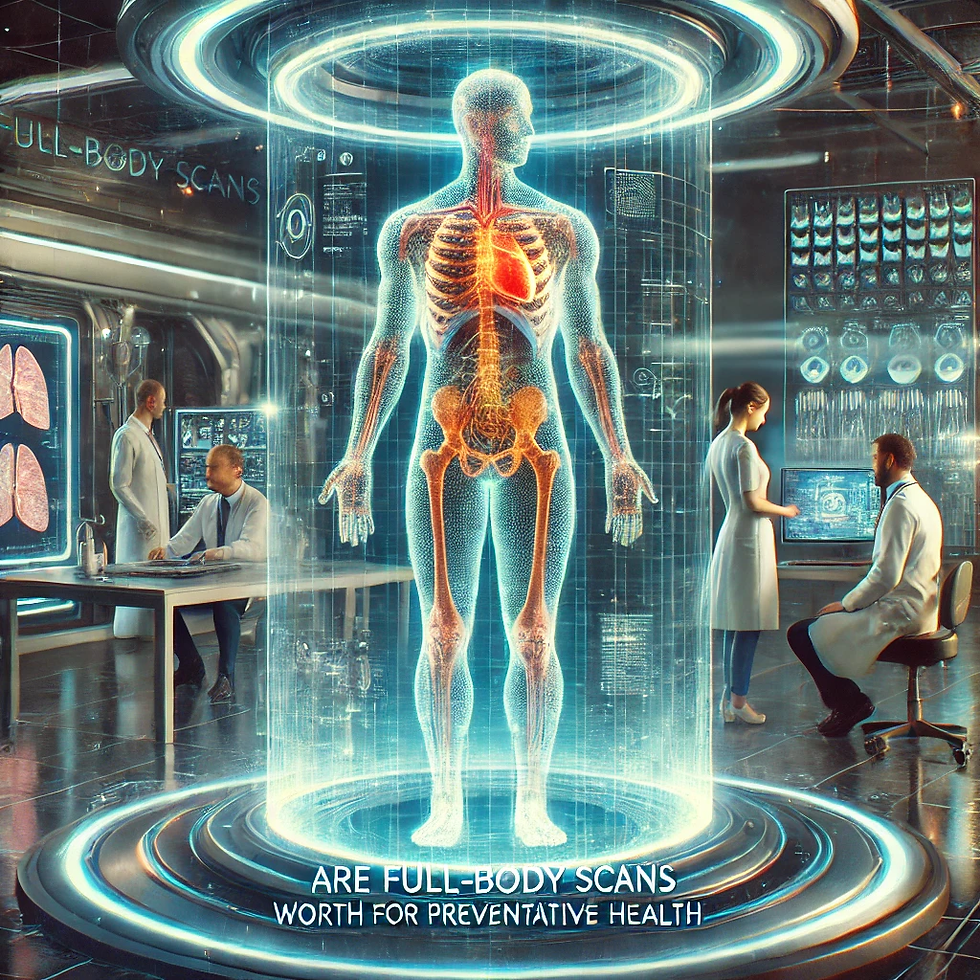
Full-Body Scans & Preventative Health: Are They Worth It?
- drsuzbaxter
- Aug 4, 2025
- 3 min read
Full-Body Scans & Preventative Health: Are They Worth It?
I love seeing people take a proactive approach to their health. It’s a massive shift from the old mindset of only going to the doctor when something feels wrong. But as full-body scans gain popularity—especially with celebrities like the Kardashians promoting them—it’s worth asking:
✔ Is this the best way to invest in your long-term health?
✔ Does it give us a false sense of security?
✔ Could the money be better spent on lifestyle improvements?
Let’s break it down.
What Do Full-Body Scans Involve?
Full-body scans typically use a combination of MRI (Magnetic Resonance Imaging) and CT (Computed Tomography) scans to capture detailed images of your organs, tissues, and blood vessels. Some providers also use PET (Positron Emission Tomography) scans to detect metabolic activity and potential abnormalities. The process usually takes 60 to 90 minutes, depending on how extensive the scan is.
These scans are often marketed as a way to catch diseases early, and they can identify:
✔ Tumors (both benign and malignant)
✔ Aneurysms and vascular abnormalities
✔ Fatty liver disease or other organ dysfunction
✔ Spinal and joint degeneration
✔ Cysts and other structural abnormalities
However, they do not typically detect metabolic issues, early-stage cardiovascular disease, or hormonal imbalances—meaning they may not be as comprehensive as they seem.

The Power of Awareness: Knowing Your Body
One of the best things about exercise and movement is that it teaches you to tune into your body. When you move regularly, you start to understand how good your body should feel—and when something is off, you notice it sooner.
This kind of body awareness is one of the most underrated forms of preventative health. It helps you recognize when:
• Something feels off with your energy levels
• A movement doesn’t feel as smooth as it used to
• You’re experiencing unexpected fatigue, stiffness, or discomfort
This can be an early warning system that something needs attention—whether it’s nutrition, stress, sleep, or something more serious.
The Problem With Full-Body Scans
Full-body scans are marketed as the ultimate preventative health tool, but they have some downsides:
1️⃣ False Positives – Scans can pick up harmless abnormalities that lead to unnecessary stress, follow-up tests, and even invasive procedures. Just because something is found doesn’t mean it’s dangerous.
2️⃣ False Sense of Security – A clear scan doesn’t mean you’re in perfect health. You can still have underlying metabolic, cardiovascular, or hormonal issues that won’t show up on imaging.
3️⃣ They’re Expensive – At around $3,000 USD, it’s a massive investment. If you’re paying out of pocket, you have to ask: Could this money be better spent on actually improving my health?
Where Should You Invest Instead?
If you’re serious about preventative health, here’s where your money might go further:
✅ Regular Blood Work – Getting a full blood panel 1-2 times a year can help track inflammation, cholesterol, hormones, and nutrient levels. This is more useful than a scan for catching early warning signs.
✅ Well-Balanced Nutrition – Instead of spending thousands on a scan, investing in high-quality, nutrient-dense meals could do more for long-term health.
✅ Exercise & Movement – A personal trainer, strength training, or structured mobility work prevents injuries, improves metabolic health, and extends lifespan—all without the need for expensive scans.
✅ Stress Reduction & Sleep – Managing stress, improving sleep, and staying hydrated have a bigger impact on longevity than any scan ever could.
So, Should You Get a Full-Body Scan?
If you’re getting it for free, why not? But if you’re paying thousands out of pocket, it might not be the best investment.
The real green tick for health isn’t a scan—it’s:
✔ Moving your body
✔ Eating well
✔ Sleeping deeply
✔ Managing stress
✔ Staying hydrated
Instead of chasing a diagnosis after something has already gone wrong, invest in the habits that keep you feeling great in the first place.



Comments